Look familiar, don’t they?
By Dwain Hebda Photography by Brian Chilson
In the past when people imagined careers in technology, they likely conjured up images of jobs requiring long hours at a computer screen held by introverts who started writing code in third grade—geeks who could construct a robot out of stray parts in their garage. Not only that, but to land such jobs required majoring in engineering or Information Technology in college and then packing up for either coast, leaving states like Arkansas behind.
But as any of today’s tech professionals will tell you, those days are long gone, if they ever really existed. Over the past decade or so, the IT world has been radically transformed to include people of many backgrounds and skillsets. In fact, a good chunk of the growth in tech industry careers are jobs that aren’t even technology based. Sure, there will always be room—and a need—for people who can write code, engineer product infrastructure, or design a platform. But a technology background is just one part of the picture in tech jobs today.
Not only have the required knowledge base and skillsets changed, but the workplace itself has been irreversibly altered, making one’s place of residence all but irrelevant. In tech, the trend toward working remotely has grown steadily for years, but 2020’s coronavirus has shifted that trend into overdrive. Most industry watchers predict that the tech workplace will never completely return to pre-COVID-19 configuration. That means living outside a traditional technology hub is no longer the career impediment it once was.
Not to mention—as local experts are quick to point out—that a growing number of tech companies are choosing to operate outside of Silicon Valley, New York, Austin, and other tech-heavy addresses, due to a lower cost of doing business and a higher quality of life. This is creating thousands of tech careers in places people don’t expect, and Arkansas is a prime example.
As the 13 professionals in this post demonstrate, there’s a lot of tech activity going on in The Natural State. These people come from different backgrounds, have various educational histories, and work in companies all across the state. What they all have in common are rewarding and challenging IT careers right here in Arkansas.
CHANGING LANES
 Artie Keith | Software Engineer
Artie Keith | Software Engineer
Teslar Software, Springdale
AFTER THREE AND a half years in the banking industry, Artie Keith decided the time had come for a new challenge. Having dabbled in programming growing up, he saw tech as the answer.
“In high school, I had taken Programming I and Programming II—at that time, that was primarily Visual Basic,” he says. “Through the years, I found myself always coming back to tutorials such as Udemy Online. When I finally decided that I was looking for something new, I was still pretty much at Square One. Then I got hooked up with the University of Arkansas’ IT Readiness Program at the global campus in Rogers. That’s where I started getting serious.”
The intensive seven-month program confirmed his decision to change careers. Today Keith is a software engineer with Teslar, a software company specializing in financial institutions. In his role, he maintains existing products, works trouble tickets, fixes bugs, and writes new features. “We get assigned projects where we’re given the end goal and some of the things that need to happen in between. The rest is up to us as a team to enact that,” he says. “That involves writing user interfaces and writing back-end code to handle all the interactions. It also involves making sure we have all of the database connections correct and getting all of the tables set. And then actually writing to and calling from those tables to use them for whatever our particular project might be.
 “Our projects range from fast, one-week timelines to some that take six months. They don’t necessarily get touched every single day. Every day is a little bit different, which is great and something I enjoy.”
“Our projects range from fast, one-week timelines to some that take six months. They don’t necessarily get touched every single day. Every day is a little bit different, which is great and something I enjoy.”
Keith says that while technical skills are obviously important in a tech career, they aren’t the only skillset that’s required, especially when one considers the tools that are available to people without a heavy tech background. “A lot of people bring up things like ones and zeros,” he says, “but in all honesty, while that stuff helps, in the software world you can write a lot of code with the help of different products. These tools handle all of the ones and zeros for you through a coding editor. So, as long as you have an idea of the big picture, you can do a lot of very productive stuff without having to do ‘nerd type.’”
Keith says level-headedness and the ability to stay cool under pressure are other critical attributes for today’s tech worker, regardless of their technical training. “There are moments when you’re just rowing your little boat out in the calm ocean and you’re making progress as you move along,” he says. “And then a crazy panic storm hits and you have these tense moments where you’re trying to fix something as quickly as you possibly can without interrupting someone else’s day or making the problem even worse. That’s real. That exists.
“I think other undersold skillsets are great communication and an eye for detail. It’s important to have the ability to remove yourself from the project temporarily and see the big picture, instead of having blinders on and seeing only this one little piece that you’re working on. Those kinds of people really excel, and they excel quickly.”
SHE’S THE BOSS

Marla Johnson | CEO/Co-founder
LeapXL, Little Rock
FROM EARLY FORAYS into broadcast technology and video game design to co-founding Arkansas’s most successful ISP company, Aristotle, Marla Johnson has done a little bit of everything in the technology space. Her latest venture, LeapXL, seeks to change the game again.
“We are bringing no-code technology to financial institutions,” she says. “Our technology allows you to connect easily to multiple data sources and then mesh it on a no-code application development platform into all kinds of dashboards, reports, workflow applications, and prototypes. It’s very powerful, very fast, really fun, and easy to do. It takes about two hours of training and then you can basically build applications and launch them. It’s super-cool.”
LeapXL’s product leverages what Johnson says is a primary trend in the technology industry, the move toward no-code products that can be run by anyone, regardless of technical background. “There are a lot of studies out there indicating that by 2024, over 60 percent of all new application development will be done on a low-code or no-code application development platform,” she says. “We’re still small. We are a startup, but we are well on our way to being a multi-million-dollar company on this technology.”
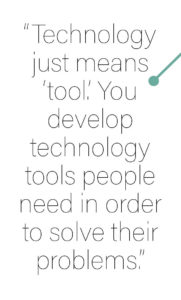 Johnson’s father sold mainframe computers, one of her brothers is a rocket scientist, and her mother was a teacher, so she grew up with an inquisitive mind and a comfort level about technology that few of her female peers had. Later, when she turned her career from broadcast journalism to tech, she was the only woman in the marketplace heading a technology company.
Johnson’s father sold mainframe computers, one of her brothers is a rocket scientist, and her mother was a teacher, so she grew up with an inquisitive mind and a comfort level about technology that few of her female peers had. Later, when she turned her career from broadcast journalism to tech, she was the only woman in the marketplace heading a technology company.
Nevertheless, she found pockets of support and ready mentors, something she credits to being located in Arkansas versus elsewhere. “I found people who were immensely helpful and supportive,” she says. “In fact, I was just on the phone with somebody today who said, ‘I want to help you because you’re not a guy. I want to help you because you’re a female CEO.’ I found in Little Rock that there are a lot of women who want to help, and also men. I’ve been lucky enough to be surrounded by people who are technical who don’t feel like they have to show that off.”
As the new generation of technology continues to unfold, Johnson says people of all backgrounds wanting a tech career should consider Arkansas first.
“If you want to be that worker bee with your head down while you’re developing and coding, and you want to do it for a giant company, you may want to go elsewhere,” she says. “But the world will never be the same now that we have COVID; there are a whole lot of tech people working from home, from any location, so your location is a lot less important than it’s ever been.
“Technology just means ‘tool.’ You develop technology tools people need in order to solve their problems, and that’s incredibly broad. You may be shocked at the number of tech companies here in marketing technology, supply chain logistics, and any number of industries. You can find really great opportunities in Arkansas.”
PAVING THE WAY

Adam Holland | Director of Security Infrastructure and Insider Trust
GlaxoSmithKline (GSK), Bentonville
AT EACH STAGE of his professional life, Adam Holland has blazed a trail for the people that followed. But for all the new ground and unexpected turns his career has taken, his role as a protector has remained unchanged.
“I actually got my start many years ago, when I was a police officer in Fort Smith,” he says. “It was when computers were beginning to become more readily accessible to the general public and we were starting to see crimes facilitated through computers, especially the targeting of children for child exploitation.
“I started the department’s first Computer Forensics Unit. We built that out into a lab and we were certified and picked up by multiple federal agencies and task forces and started doing cases in the tri-state area.”
After leaving law enforcement, Holland worked as a consultant and eventually found himself at Walmart. While there, he was able to finish his college degree and develop his computer forensics training into expertise in cybersecurity that he uses daily in his current role at GSK, the global healthcare company. “As an investigator, I saw how technology can become weaponized, instead of used appropriately,” he says. “Now in the private sector and retail, I can look with a lot of different lenses at the problems we face, whether it’s architecture and deployments or protections, since I’ve spent most of my career in computer security and cybersecurity.”
Holland says that where once it was unusual for someone to get into the field of cybersecurity from another field, such is not the case now. In fact, he says, many people find it easier to enter cybersecurity after earning work experience elsewhere. “There was a time where you were a ‘computer expert,’ because the field was very small,” he says. “Fast-forward to the present day and you’re building your expertise in certain technology disciplines or areas of interest. You’re no longer forced to fit into a very small, specific path. A technology career is more built around your interests and specialties.”
Another trail that Holland blazed has been helping attract and create opportunities for people of color within the technology field. “There’s been a huge shift,” he says. “One, there’s a huge deficit in applicants for open roles in technology, period, and especially in the cybersecurity roles. So the industry is starved for talent.
“But the industry is also in a constant state of scramble to deliver what consumers want in technology, and persons who have different ethnic and cultural backgrounds play a role in driving it. A company can’t figure that all out on its own; it needs people to come in and help ensure they’re seeing everything and taking in all different angles. That said, there’s still a huge need to attract other ethnicity, gender backgrounds, even age into the field. That’s definitely something that we still need to work on.”
TRUE NORTH

Sarah Daigle | Technical Program Manager
Cognizant Technologies, Bentonville
TECHNOLOGY PROFESSIONALS DON’T work in a vacuum; they are most often part of teams collaborating on a project together. Keeping these teams on task and working smoothly is the job of Sarah Daigle, who in her role with Cognizant Technologies acts something like a movie director keeping all the parts spinning in unison.
Cognizant applies cutting-edge technology to digitize business systems and processes. “My day really is spent leading thirteen small tech teams, mostly engineers,” she says. “We’re trying to build enterprise off of big pieces of Cloud software. I’m planning which features need to go into this application to be meaningful, and I spend my day thinking about how we should build that feature, and if we should build that feature, and if we do, will it be popular? That’s the fun, conceptual part of the work.
“The technical part is, which team is going to take pieces A, B, C, or D, and what decisions or integrations do we have to make with it? If we add these buttons, what does it connect to, who does it talk to, and who needs to know, from a communications perspective, that we’re going to add this thing?”
Growing up in Canada, Daigle started life wanting to be a high school teacher, but a new tech course in college caught her eye instead. “It was nine months where you got a taste of everything—databases, networking, programming,” she says. “Some U.S. for-profit schools were advisors to the program. They said, ‘We’ll hire your top students. Get a graduate degree with a B or greater and we’ll put them at one of our five schools in the U.S.’ So I enrolled in this program, and it was the perfect mix of my math and education desires. I fell in love with the job of program language.”
Since coming to the U.S., Daigle has worked with a wide range of fellow professionals. She says it’s a field that’s broad enough for all skillsets, so it takes some time to distill these jobs down to find a perfect match. “You have to know thyself, as the saying goes,” she says. “What is it that drives you and what is your goal? If you are a very introverted, high-tech minded person with these product visions and you don’t want to manage people or be on a boisterous team, there is a path for you. You could become an extraordinary engineer or architect.
“I made a choice to lead people and product and create the vision. I was a mediocre software engineer, but I was excellent with people. Being a manager who has tech experience on a tech team does bring something. It’s not required, but it is helpful because I do understand a little bit more of their lingo and how troublesome it is to build something if you don’t have a roadmap.”
TOP GUN

Chris Wright | Founder
Sullivan Wright Technologies, Little Rock
CHRIS WRIGHT STARTED his professional journey in the United States Air Force, where he had set his mind on becoming a military pilot. He excelled in the USAF program, eventually landing in the selective Navy flight school. Once there, he made a startling discovery.
“There’s a lot of hype and coolness to flight school—that Top Gun aspect,” he says. “But I realized quickly that that wasn’t the path I wanted to go. I transferred back into the career field the Air Force called ‘communications’ at the time. It was basically the technical side of all that: IT, radios, navigational lights for aircraft, satellite communications.”
Wright was also introduced to cybersecurity, and from the start, he knew he’d found his calling. He subsequently held cybersecurity positions during the remainder of his military service, and later in the USAF reserves and within the private sector. Eventually, he went out on his own to launch cybersecurity companies, including his current venture, Sullivan Wright Technologies.
To be successful in the field of cybersecurity, says Wright, you must first develop an aptitude in other areas of IT and technology. “Whenever anybody asks me what kind of degree program or education program to go into for cybersecurity,” he says, “I always warn them against some of these that are called ‘cybersecurity’ but don’t have good computer science or computer engineering underpinnings to it. I like to look at the bigger sphere of technology. There are three bubbles in it: You’ve got the software development bubble, you’ve got the IT bubble, and you’ve got the cybersecurity bubble. Those cross in different areas and in different amounts, depending on how you look at certain circumstances. It does help you to be a better IT person and a better cybersecurity person if you can at least do some software development.”
At the same time, what makes a successful cybersecurity professional isn’t just technical expertise. “Really, the big thing I’m looking for besides technical aptitude is curiosity,” says Wright. “You have to be able to go out and learn on your own. In the military, the joke was that if the Army wanted us to have that, they would have issued it to us.
“But that doesn’t describe my military career at all,” Wright says. “It was all about going out and learning on my own. There are so many ways to do that in cybersecurity. If you’ve got a computer, you can do most of the things that we do in cybersecurity in a controlled environment—your house—that’s not going to get you arrested. Going through training programs, watching YouTube videos, reading websites and books—you have to be willing to go and find it and toy with it.”
VOICE OF EXPERIENCE

Stacy James | Lead Executive of Enterprise Data Management and Business Solutions Center
Arkansas Blue Cross and Blue Shield, Little Rock
WITH A NEARLY 30-year career at the same company— and in the male-dominated technology field to boot—Stacy James is something of a unicorn. Graduating from the University of Arkansas at a time when only about 20 percent of tech students were women, she came directly to Arkansas Blue Cross Blue Shield as an entry-level programmer.
Almost three decades later, she leads a department of around 120 tech workers and is responsible for the company’s enterprise data governance, enterprise architecture, third-party risk management, and IT asset management, among other important responsibilities. Not bad for someone who was originally planning to be an accountant.
“As a student, I had an interest in everything,” says James, who grew up in Fort Smith. “But when I got into high school, I took an accounting class. I’m quite a detailed, linear, analytical person, and accounting seemed very black and white. I really liked it.”
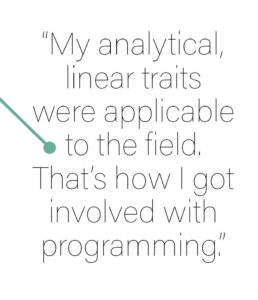 But when she got to college, one of her courses was in computers. And with the help of an invested professor, she discovered to her surprise that she had an aptitude for technology. “I took my first class and I was like, I really like this,” she says. “My detailed, analytical, linear traits were applicable to the field. That’s how I got involved with programming.”
But when she got to college, one of her courses was in computers. And with the help of an invested professor, she discovered to her surprise that she had an aptitude for technology. “I took my first class and I was like, I really like this,” she says. “My detailed, analytical, linear traits were applicable to the field. That’s how I got involved with programming.”
After an internship with nearby trucking giant J.B. Hunt, James joined Blue Cross Blue Shield and never looked back. She says her advice to young people today is to keep their minds and options open when it comes to both education and career. “You don’t have to decide immediately when you go into school what you want to major in,” she says. “At least the first year, take classes you’re interested in. For me, I had accounting and an introductory computer class and that computer class changed my mind as to what direction my studies were going to head in.
“I’d also mention to get involved in different activities around campus, whether it’s related to your major or not. I was president of what was then our data processing management association. Getting involved in different activities related to your area of study is really helpful; it helps resume-building as well as gets you some different experiences.”
James also says that an attitude of lifelong learning is vital to a long career, especially in technology. “In 2011, I had been in the same department for 14 years. I needed and wanted a change,” she says. “At that point I went into project management and got out of IT for four years. That was a very positive move for me. It got me out of the technical world and opened my eyes to every aspect of the health insurance business. With project management, you have to have very good communication skills, planning skills, and organizing skills, and that’s what I honed during that time. That prepared me for the role that I’m in today. I definitely think any type of leadership or communication skills that a tech person can develop just makes them more valuable.”
THE LONG WAY HOME

Hannah Baum | Programmer
Hytrol, Jonesboro
DURING COLLEGE, HANNAH Baum did seemingly everything but target a career in tech. Despite having a father who was a programmer, the Kansas City, Missouri, native started her post-secondary work with an eye on health care. After earning a bachelor’s degree in Biology, she bounced around from one graduate health program to another, each time coming to the same conclusion.
“I did a semester at medical school,” she says. “Then I took a year off because it wasn’t working so hot. I came back and after a week I quit. I was like, ‘I don’t want to do this.’ I decided I’m going to go into Psychology; I quit before it actually started. I did a year of a nursing program and I realized I hated it even more than medical school, so I quit.”
Recalling her childhood interest in programming, honed at her father’s elbow, she decided to give tech a try. Living in Arkansas by then, she landed an internship with Hytrol, a Jonesboro manufacturer of conveyors and other inventory handling systems. “I was an intern for a summer and helped implement a new system that dealt in human capital management,” she says. “They went from an all-paper-based system to all-digital and I was the person who really helped move everything to the digital system and teach everyone how to use it.
 “Since that went well, my supervisor was like, ‘I’m going to hire you.’ That was a really great day for me because I don’t have a Computer Science degree, right? I think that’s one reason I really, really like this field. A lot of times you can’t get a job unless you have a degree. Here, it’s more about how competent and capable you are, rather than your credentials.”
“Since that went well, my supervisor was like, ‘I’m going to hire you.’ That was a really great day for me because I don’t have a Computer Science degree, right? I think that’s one reason I really, really like this field. A lot of times you can’t get a job unless you have a degree. Here, it’s more about how competent and capable you are, rather than your credentials.”
What Baum lacked in a diploma (she’s since started work on a Computer Science degree) she more than made up for in other areas. She says that one of the lesser-known facts about a tech career is the weight that communication and customer service skills carry in many positions. “Being able to communicate with other people, and enjoy it, really helps,” she says. “If you can actually sit down with people and explain things and be more of a collaborator instead of us-versus-them, their-department-versus-my-department, things run so much smoother.”
Baum advises the next generation to think similarly outside of the box when it comes to skills development for a career in the technology field. “If I could go back and redo my college education, I would take a bunch of classes on logic,” she says. “I think that’s so helpful because whether you’re coding or designing something, logic is very, very helpful. If you can understand this leads to this—or it doesn’t—you can solve a lot of problems.”
SOLUTION-ORIENTED

Matt Olson | President
Matmon Internet, Inc., Little Rock
MATT OLSON LEARNED early on the value of marketing oneself, especially when it came to technical skills. While attending Lake Hamilton High School in Hot Springs, he joined a class called WolfNet, which dealt in all things IT.
“This was in 1994 and I was learning about networking and installing RAM and software on computers,” says Olson. “If I was walking down the hallway during class, and I wasn’t supposed to be in the hall, a teacher wouldn’t stop me and say, ‘Go to class.’ They would say, ‘Hey, Matt, could you come help me with my computer?’”
That, says Olson, was when the light went on in his head. “It was like, wow, they’re seeing that I have value other than just being in class. And it happened a lot, not just one or two teachers. All the teachers knew the WolfNet kids, because we were in there getting their Internet set up.”
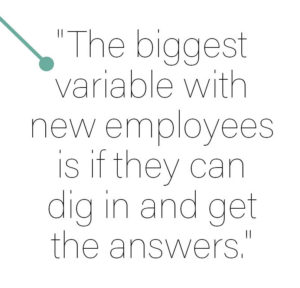 From these basics, Olson graduated to other functions, some of it learned in the classroom, a lot of it self-taught. “I was a computer science major at UA Little Rock, which got me involved in programming,” he says. “I also worked at the computer library helping students with software, helping them with Excel spreadsheets, printer issues—you know, I was a lab aide. While I was doing that, I learned about building my own websites. I was sitting there in the computer lab working, but I was also reading and learning how to make websites, buying domain names and all that. That’s really where it all came from.”
From these basics, Olson graduated to other functions, some of it learned in the classroom, a lot of it self-taught. “I was a computer science major at UA Little Rock, which got me involved in programming,” he says. “I also worked at the computer library helping students with software, helping them with Excel spreadsheets, printer issues—you know, I was a lab aide. While I was doing that, I learned about building my own websites. I was sitting there in the computer lab working, but I was also reading and learning how to make websites, buying domain names and all that. That’s really where it all came from.”
Today, Olson is president of his own full-service marketing company helping businesses build their brand. The company leans heavily on digital media, so website building and programming are still central to the company’s services.
“You have to be solution-oriented in this business. You need to find the solutions in how you approach things and through research,” he says. “The biggest variable with new employees is if they can dig in and get the answers. If they can keep bringing solutions and keep trying, then they’re the right fit. If they give it a quick one little chance and then expect you to tell them what to do, they don’t make it.”
As for why he decided to stay in his home state, he says that customers can be found anywhere, but quality of life can’t. “You can get swallowed up in a big city and never feel like you’ve even scratched the surface,” he says. “You go to downtown New York and no one even looks at you. Here you have more opportunities, I think, to really establish yourself. Arkansas is a really special state.”
BY THE NUMBERS

Malachi Nichols | Director of Evaluations and Data Quality
ForwARd Arkansas, Little Rock
TEXAS NATIVE MALACHI Nichols has a passion for the state of education. During college at the University of Arkansas, he taught math, history, and robotics in a local private school. After completing his doctorate, he joined ForwARd Arkansas, a nonprofit dedicated to improving the quality of the state’s schools.
Working behind the scenes to support and improve what’s going on in Arkansas classrooms gives him a chance to make a difference in thousands of young lives.
“Looking back, I truly did enjoy teaching students,” he says. “But I knew teaching wasn’t going to be my long-term fix. I saw that between my math and science skills and my ability to think abstractly, there was an avenue for me to use those skills to change schools. Not by being a teacher, but by being a researcher.”
 Nichols’ job responsibilities include working with community partners to help identify ways to improve schools throughout the state. He also compiles and organizes data that’s given to state legislators as they consider new state laws. His work also assesses the performance of ForwARd Arkansas itself, to make sure the nonprofit is operating efficiently and effectively.
Nichols’ job responsibilities include working with community partners to help identify ways to improve schools throughout the state. He also compiles and organizes data that’s given to state legislators as they consider new state laws. His work also assesses the performance of ForwARd Arkansas itself, to make sure the nonprofit is operating efficiently and effectively.
Arkansas offers a wealth of technology career opportunities, Nichols says. “In Northwest Arkansas, I see a strong push for tech people just to support the dominant businesses here, such as Walmart, Tyson, and J.B. Hunt,” he says. “But also, people who have those data systems and information systems management can really develop around the state. Especially post-COVID, you don’t have to pick up and move your family to Fayetteville or Little Rock or to a town with a university. Now, you just log in remotely and you’re able to stay in your community and connect to the job market.”
Nichols has two recommendations for the next generation of tech workers—learn as much as you can about various tech careers and don’t limit your education just to math, science, and computers. “When I was coming up in high school, I never knew there were people who actually did research on education,” he says. “A lot of it is lack of exposure, whether it’s in the African American community, the Hispanic community, the white community, or whether that’s the rural community. It’s hard to become what you don’t see.
“As for education, honestly, what’s important is your English and your writing skills. What will set you apart is being able to clearly articulate not only what you think, but what you’re doing in a fashion the layperson can understand. It’s taking complicated information and all of the techy things and being able to present it to somebody who’s never entered the field. That’s a very important skill and it’s something you can start building in high school.”
GOAL-FOCUSED

Aaron Green | Robotic Process Automation Developer
Arvest Bank, Fayetteville
EVER SINCE HE can remember, Aaron Green knew he wanted a tech career. “My dad has always been a technical guy,” Green says. “He’s done a lot of computer repairs, and I was always interested in that growing up. There were times when he’d be delivering a part to go to a customer’s house and fix it, and I’d be part of those jobs.”
In addition to what he saw of his father’s work, Green also liked working puzzles and other brain-teasers, and today he says he applies that same analytical mindset daily. “Puzzles and software development are sort of the same thing, just a big problem-solving exercise,” he says. “You’ve got to understand the problem. You’ve got to know how to address certain difficulties. And you’ve got to know how to get information.”
Green joined Arvest Bank full-time in June 2019. Since then, he’s been working on software projects that reduce keystrokes and mouse clicks, thereby simplifying and streamlining functions for bank employees. Tech careers abound in the business world, he says, even for people who didn’t start programming early, as he did. “There is always demand for people with technical skills—it’s one of the most competitive fields out there,” he says. “You don’t need specific skills, you don’t need to have X number of years of experience. It’s more about your determination and your passion for it and how hard you’re willing to work for it and not be afraid to try anything new.
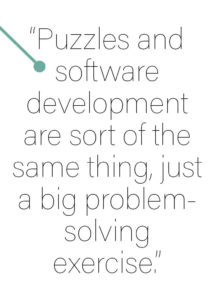 “We have people on our team who didn’t go to school for technology, but they have lots of experience within the company. They know the company better than someone like me, who has the technical training. So, there’s definitely room for people who don’t have that background but have the interest and the capacity to learn. There’s always something you can bring that someone else can’t.”
“We have people on our team who didn’t go to school for technology, but they have lots of experience within the company. They know the company better than someone like me, who has the technical training. So, there’s definitely room for people who don’t have that background but have the interest and the capacity to learn. There’s always something you can bring that someone else can’t.”
Given this fact, young people looking to prepare for a career in technology should pay attention to team building and communication skills as much as coding and programming. Green says that no matter how technically proficient a person is, the ability to work with other people is just as important—if not more so. “Being around people is going to help build those communication skills,” he says. “I took a robotics club in high school and that helped a lot, just being around people. A lot of us, when we’re studying or getting experience training, we’re locked up in our room. A big part of it is just getting out there.
“Also, you may want a certain tech field, but you have to start somewhere, and it might not be where you really want. My advice is just be willing to learn new things and to take a job that you may not have expected. You can build your profile from there.”
THE NATURAL

Keenan Gillispie | Software Developer
Apptegy, Little Rock
KEENAN GILLISPIE GREW up in a tech-savvy household and followed a predictable path—heavy on STEM coursework and skills—to college and the working world. But as the tech workplace becomes more diverse, the Bauxite native says that careers that follow this traditional tech pathway aren’t nearly as numerous as they once were.
“The stereotype is people who have followed my path, who have been interested in tech for as long as they can remember,” he says. “That seems to be diminishing; I don’t think we’re in the majority by any means. I work with people who came up through music programs, have history degrees or writing degrees, and are now in the same software development field.”
At Apptegy, which provides software and products to help schools effectively market themselves, Gillispie provides support for other developers, trouble-shooting issues and making sure the production servers are operating properly. He says that as software products have become more complex, they require additional skillsets and perspectives to create and maintain. He thinks that’s one reason tech workers now demonstrate a broader range of backgrounds.
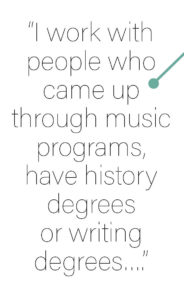 “We’re not building, necessarily, physical things,” he says, “but we are building things. We’re building software functionality. It requires being able to understand very abstract concepts. For that reason, I think creativity is an absolutely vital component for working in this industry.
“We’re not building, necessarily, physical things,” he says, “but we are building things. We’re building software functionality. It requires being able to understand very abstract concepts. For that reason, I think creativity is an absolutely vital component for working in this industry.
“And I hope this is not too cliché, but the biggest skillset is really communication, whether you’re a more traditional software developer/code monkey or you’re a software architect. It’s going to require you to speak to other people with different skill sets, different backgrounds, and who do different things.
As developers, we’ve got to be able to talk technically and not-so-technically with other groups within the company to convey information. It’s vital. If you can’t communicate with those different groups, you’re going to have trouble.”
Gillispie, whose father is a software developer and whose mother is a technology coordinator in the local school district, says he didn’t feel the need to look outside Arkansas to find a fulfilling tech career. In fact, he offers a word of caution to anyone who automatically thinks the tech grass is greener in bigger cities. “For those looking to move to a bigger tech hub and work for one of these giant tech companies, I suggest you do your research,” he says. “Look into the stories of people who have done this and see if you like what they have to say. There are some highly renowned tech companies that are amazing to work for that have great cultures, great benefits, and great work environments. And there are some that have a big name but that are less than ideal to work for.
“Don’t just dream about it. Try to seek people out who have tried it and understand their experience to see if it’s something you want to pursue. In my case, I haven’t wanted to uproot everything and move thousands of miles away and fight with everybody else to do the exact same thing. There are plenty of companies here locally where I can do this job and I can contribute.”
A WORLD OF EXPERIENCE

Jeff Brinsfield | Vice President of Information Systems
QualChoice | Little Rock
ARKANSAS NATIVE JEFF Brinsfield could’ve headed to a bigger city to pursue his lofty career goals, but he got all he wanted by looking right in his backyard. Prior to joining insurers Centene and QualChoice, where he’s now vice president of information systems, Brinsfield started his career with Arkansas Systems, later Euronet, which sent him around the world.
“I joined them in 1998, and two months after I started, I was sent to Sri Lanka to install a banking system,” he says. “I was based out of Budapest, Hungary, for four years. I eventually went to forty countries and saw the world. It was phenomenal seeing all of the different cultures.”
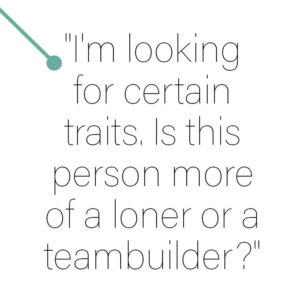 Bringing his global experience back to the States, Brinsfield has continued his corporate career in IT. His work today—developing world-class versatile work teams—benefits from his inclusive perspective. “Information technology is so multi-faceted and it touches all parts of an organization,” he says. “My team deals with hardware, software management, infrastructure, data analytics, project management, security, testing and design. A number of teams that report to me deal with each of those aspects.”
Bringing his global experience back to the States, Brinsfield has continued his corporate career in IT. His work today—developing world-class versatile work teams—benefits from his inclusive perspective. “Information technology is so multi-faceted and it touches all parts of an organization,” he says. “My team deals with hardware, software management, infrastructure, data analytics, project management, security, testing and design. A number of teams that report to me deal with each of those aspects.”
In his daily work, Brinsfield provides high-level direction and strategic problem solving across various work groups. Managing multiple teams, as well as interacting with other departments to build projects and work through problems, takes coordination and teamwork. The ability to synthesize skillsets is key to keeping things moving forward. “We’re fulfilling those other teams’ needs,” he says. “We’re a service part of the organization to other teams. Whether it’s the data analytics side or the project management side or the software management or development sides, having an exposure into those teams is what helps you do this job really well.”
Given the wide variety of work for which his department is responsible, there’s no “typical employee,” Brinsfield says; instead, there’s room for all personality types and skillsets. “I’m looking for certain traits. How’s this person going to fit in with the team? Are they more of a loner style or are they more of a team builder who likes working in a group? There’s definitely room on both sides and there’s a demand for both sides.”
More than technical expertise, Brinsfield said he values intangibles in choosing the right employee. “Attitude is a big piece of it,” he says. “A key aspect of being able to do IT project management or support service is someone who has that ability to connect to other departments and teams, interact with people, and, in some cases, help teach them about the equipment or software. Having a problem-solving attitude and mentality goes a long way with that.”
PASSION FOR LEARNING

Virginia Hickman | Quality Assurance Engineer
Movista, Bentonville
VIRGINIA HICKMAN IS a gatekeeper. In her role with Movista, a retail management software company, she’s one of a team of tech professionals who tests the company’s products to make sure they perform as advertised. It’s a critical role, one that heads off issues before they get to the customer.
Hickman is a natural at her job, born of a helping spirit and a natural inquisitiveness—all the more remarkable considering that she’s never considered herself “techy.” “I had worked at the Walton Arts Center in Fayetteville for a really long time as an undergrad,” she says, “and anytime something happened to the computer, I would call the tech person. I never had a mind for tech—I never thought I’d want to do it.”
Hickman’s education and job experience tended to reinforce that belief—she holds a degree in anthropology and previously worked as a yoga instructor. Then a friend insisted that she had the right “thought process” for a tech job. On his advice, she enrolled at the University of Arkansas Global Campus. “I just wanted to get my feet wet,” she says, “so I did an online prerequisite, which was an HTML course. I loved it. It was a very gentle way of getting into programming. And then, when we started our other classes, it was like drinking from a fire hose, but I loved that, too.”
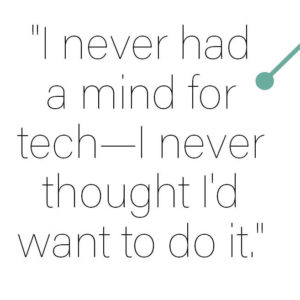 Hickman joined Movista 18 months ago as a QA analyst and soon moved into her present role. “Being a QA Engineer, you test the product and make sure it’s as bug-free as you can get it,” she says. “The bugs aren’t anything malicious. It’s usually something that’s preventing the user from doing what the user wants to do—you know, there’s a new version of the app and it doesn’t work like the last version did. It’s my job to catch all those bugs before it goes to production.”
Hickman joined Movista 18 months ago as a QA analyst and soon moved into her present role. “Being a QA Engineer, you test the product and make sure it’s as bug-free as you can get it,” she says. “The bugs aren’t anything malicious. It’s usually something that’s preventing the user from doing what the user wants to do—you know, there’s a new version of the app and it doesn’t work like the last version did. It’s my job to catch all those bugs before it goes to production.”
While Hickman spends her days surrounded by people who have followed the traditional tech path, she’s a firm believer that you don’t have to have a technology background to find a rewarding career in the field—all it takes is the right attitude and a willingness to learn outside of your comfort zone. “The most helpful thing to me was just doing it,” she says.
And her advice to anyone considering a tech career? “I would say start with anything HTML,” she says. “It’s pretty easy to learn and you see immediate results. It’s fun and it’s a very good introduction to programming. Then take any free courses you can take. I sometimes watch YouTube videos and coding interviews, even though I’m not looking to get hired anywhere. They’re just interesting to see.”


